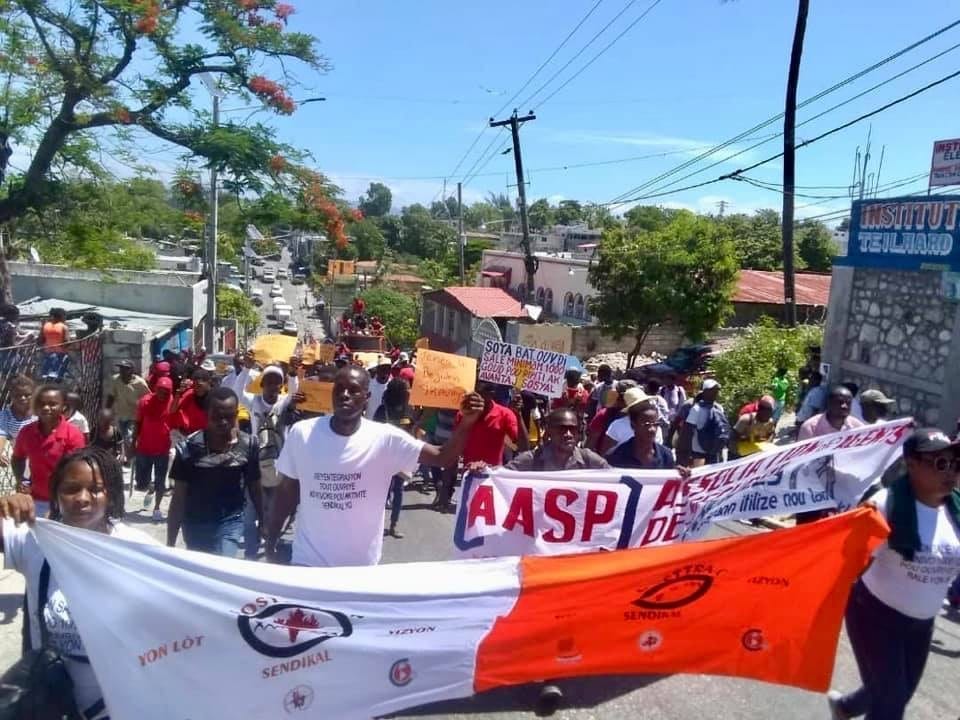
Jan 9, 2020
Ten years after a magnitude 7 earthquake destroyed a large swath of Haiti, killing more than 300,000 people and injuring another 1.5 million, workers and their families have not benefited from the billions in international aid that poured into country after the disaster. Nor has the government’s response—expanding low-wage, garment-sector jobs—alleviated poverty. Instead, they struggle to support their families with wages too low to live on even as escalating prices for fuel and other necessities compound the difficulties in their daily effort to survive.
“Workers live day by day,” says Reginald Lafontant, secretary general of the Groupement Syndicat des Travailleurs Textil pour la Reimportacion d’assemblage (GOSTTRA), a garment worker union and Solidarity Center partner.
In response to ongoing mass protests last fall against fuel and food shortages and government corruption, President Jovenel Moïse increased the minimum wage for garment workers and others in the export manufacturing sector from 420 gourdes a day to 500 gourdes ($5.09) a day. The miniscule increase left workers’ wages at less than 2018 levels because of inflation, and the move infuriated workers, who told Solidarity Center staff that the new wage is not enough to pay for food, transportation, housing, children’s school fees and medical care.
Workers Need $18.30 a Day to Support Themselves
More than 60 percent of Haitians survive on less $2 a day, and more than 2.5 million people fall below the extreme poverty line of $1.23 per day. The Solidarity Center report, “The High Cost of Low Wages in Haiti,” which tracked living expenses for garment workers from September 2018 through March 2019, recommends the government increase the minimum wage to an estimated $18.30 per day and allow workers to select their own representatives to the country’s tripartite minimum wage committee.
The cost of living in Haiti has increased by 74 percent since the Solidarity Center’s first wage assessment in 2014. Based on the current minimum wage, workers must spend more than half (55 percent) of their take-home pay on work-related transportation and a modest lunch, leaving little else to cover other necessities. Some workers say they can only afford to eat once per day.
The country’s inability to provide basic goods and services affects workers’ job security as well. With no propane available for cooking in the city, businesses last fall put their staff on unpaid leave. Hotels are closing and major airlines have cancelled flights to the country because of the economic and political turmoil, increasing unemployment and choking off income from much-needed tourist dollars. Haitians are outraged that the island has received millions of dollars in aid since the 2010 earthquake, but public services and infrastructure are nearly nonfunctional.
Haiti’s economy, which never recovered after the earthquake and the subsequent cholera outbreak that claimed some 10,000 lives, has worsened over the past three years. The Haiti Advocacy Working Group, which includes the Solidarity Center, is calling for policies that focus on an equitable and livable future and “promote the creation of decent employment that enables Haitian workers to adequately care for themselves and their families.”
Unions are in the forefront of calling for action to address the crisis. More than 40 labor organizations joined a call last fall for vast nationwide legal reforms, including free and fair elections and the resignation of Moïse. More recently, three Solidarity Center partner unions in the garment industry—GOSTTRA, Batay Ouvriye and Centrale Nationale des Ouvriers Haitiens (CNOHA)—rallied to call for better working conditions, the proper management of pension and social security funds, a living wage and government accountability for corruption.
The government failed to hold elections in October, and one-third of the Senate, the entire Chamber of Deputies and all local offices are set to expire in January 2020, setting the stage for a potential constitutional crisis and another round of widespread protests.
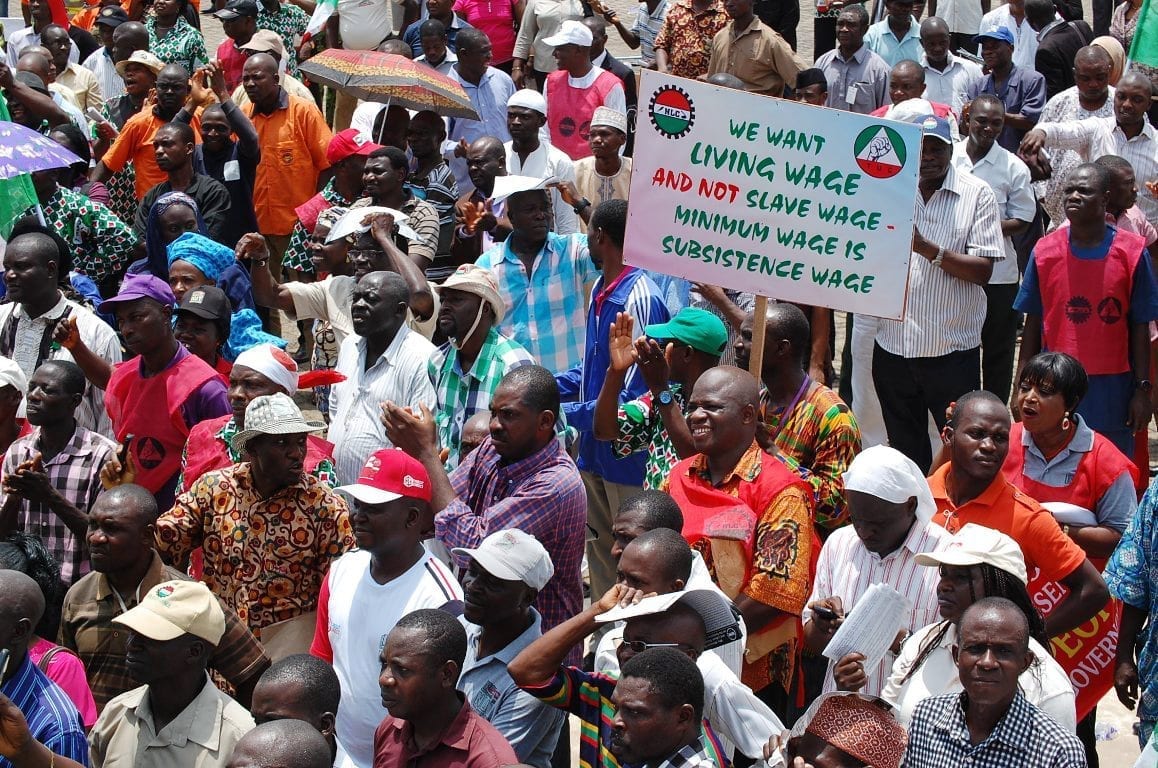
Jan 29, 2019
The Nigeria Labor Congress (NLC) is encouraging workers to gather at a National Assembly public hearing this week to implore lawmakers to implement a new minimum wage bill affecting 11 million workers, and reject a proposed two-tier minimum wage bill that will rob state workers of a minimum wage increase all workers were promised more than two years ago.
A proposed minimum wage of $83 per month—a 60 percent increase over the current minimum wage–was recommended by Nigeria’s tripartite minimum wage committee following years of negotiations and endorsed by President Muhammadu Buhari last year. Workers have seen a steady erosion of their purchasing power caused by rising inflation, with the cost of staple foods rising more than 11 percent last year.
The minimum wage committee’s proposal must be adopted into law by the country’s 360-member House of Representatives in order to take effect, but passage of the law has been imperiled by Nigeria’s state governors, who last week approved a minimum wage of only $74 per month for state workers.
The country’s current minimum wage—$49.60 per month—is not a living wage, say workers, who accepted $83 as a compromise to the $164 per month they said would fairly compensate them and help them survive under hyperinflation.
Nigeria’s unions have been engaged in a years-long effort to increase the minimum wage. A threatened general strike in October 2018 was called off only a few hours before it was scheduled to begin, after the wage committee agreed to increase the minimum wage to $83. A second general strike was called off last week after a new national minimum wage bill was submitted to the National Assembly.
If a general strike is triggered, all public-sector institutions—including schools, hospitals and the oil sector—will be affected.
“We all need to stand ready in a state of full mobilization,” said Nigerian Labor Congress (NLC) General Secretary Peter Ozo-Eson.
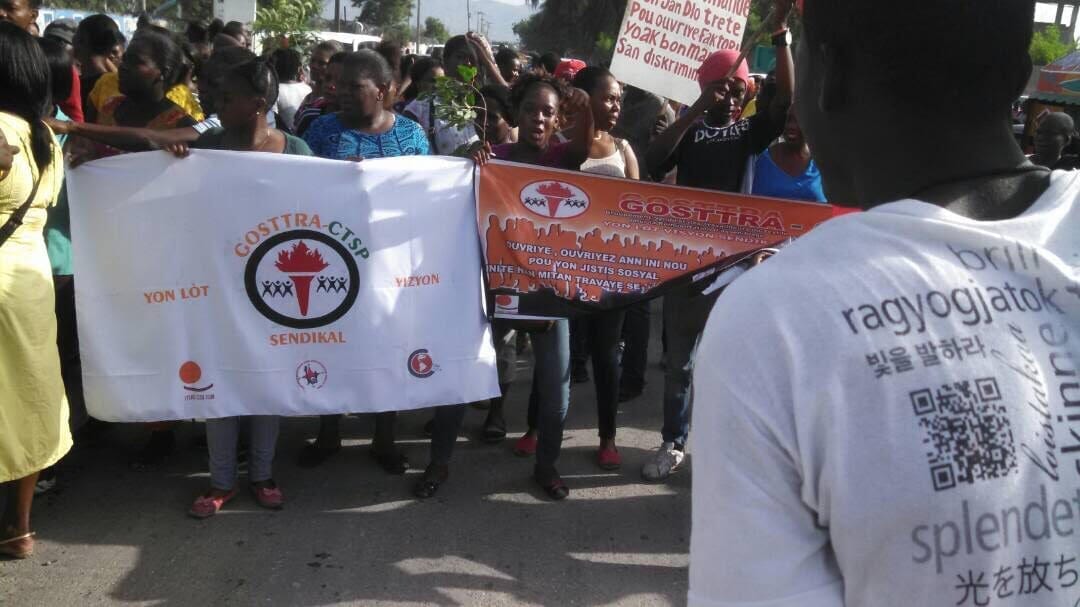
Jul 25, 2017
Update: On July 27, the Haitian government announced a slight minimum wage increase for garment workers that fall far below workers’ demands for a wage that would enable them to support their families. The minimum wage will rise by 81 cents a day, to $5.73. Union members plan to launch a week-long strike on Monday.
Thousands of garment workers in Haiti took to the streets this month to demand an increase in the sectorwide minimum wage that leaves most workers unable to cover bare necessities.
The current daily minimum wage is 300 Haitian gourdes, or $4.70. Garment workers are demanding that the minimum wage be increased to 800 gourdes, or about $12.70 a day. In 2014, before the devaluation of the Haitian currency and the onset of double-digit inflation, the Solidarity Center found that a real living wage for Haitian workers would be at least $23 a day.
This round of strikes is the latest in a series of demonstrations that began May 19 in the wake of a 30 percent spike in fuel costs, which resulted in dramatic increases to food and transportation expenses for workers. Striking workers are also calling for health benefits and food and transportation subsidies.
Unions are calling on employers to respect workers’ rights to freedom of association, citing numerous instances when workers who tried to form organizations to represent their interests were terminated, threatened or blacklisted. Approximately 45 union leaders from GOSTTRA who were fired in the midst of the May demonstrations remain out of work.
The tripartite Superior Council of Wages (CSS), which includes only two labor representatives and is tasked with providing Haiti’s executive branch with a recommendation for wage increases, issued its latest report on July 10. In the report, the CSS recommends that the daily minimum wage increase a mere 35 gourdes, or 55 cents, citing the need to keep Haiti competitive as the nation seeks to attract more employers in the sector.
Workers are, not surprisingly, outraged by the recommendation of the CSS. They also disagree with the suggestion that the wage increase be implemented in August without retroactive pay to May, as has been the custom in prior years.
Employer representatives, namely the Association of Industries of Haiti (ADIH), have continued to express a desire to offer only minimal wage increases to keep Haiti as a low-wage destination for global brands. In late June, six companies wrote to Prime Minister Jack Guy Lafontant to demand that the government intervene and quell worker protests related to the minimum wage. As the situation continues to escalate, the focus shifts to President Jovenel Moise and the executive branch. The presidential decree on the minimum wage is expected to be released in the near future.
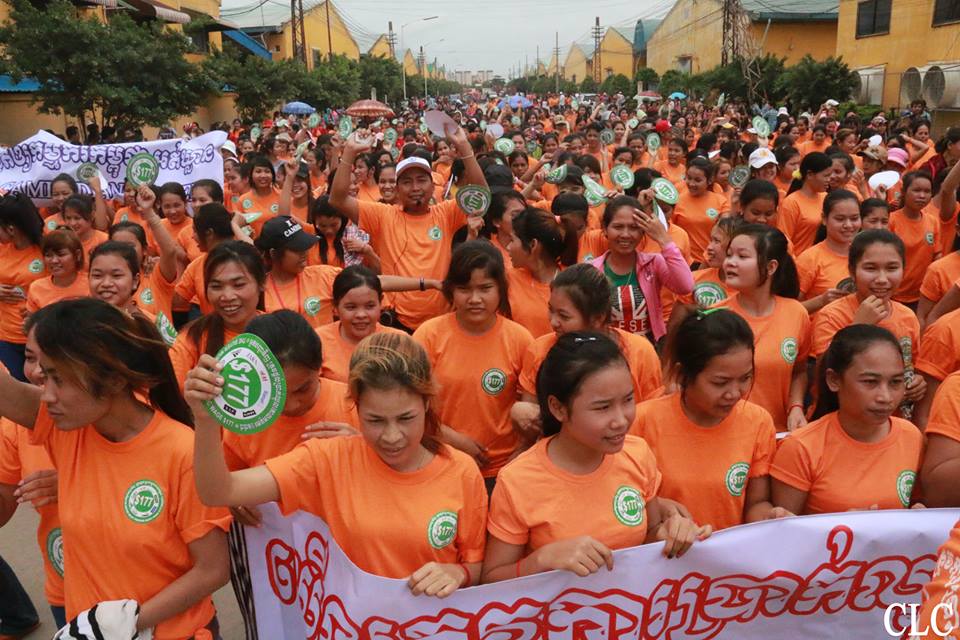
Mar 29, 2017
Cambodia’s draft minimum wage law would prohibit unions and other civil-society organizations from contesting the country’s minimum wage and would go so far as to restrict their ability to even conduct research to craft minimum wage options, according to a legal analysis by the Solidarity Center and its partners.
“As it stands, the draft could potentially criminalize all forms of protest in relation to the minimum wage, which has been the motivation for some of the biggest demonstrations in recent memory,” says Chak Sopheap, executive director of the Cambodian Center for Human Rights (CCHR), which analyzed the draft.
“It is an affront to the constitutionally protected fundamental freedoms of expression, association and assembly, and must not proceed,” he says. (The analysis is available in English and Khmer.)
The law also would exclude many categories of workers, including domestic workers, civil servants, some transportation workers and workers in the informal economy.
Draft Law Blocks Worker & Union Input
“The government has routinely criminalized legitimate trade union conduct, in violation of international human rights law. The vague prohibition of ‘illegal acts’ in regard to pressuring the government over the minimum wage would seriously undermine the legitimate work of labor activists,” explains Jeff Vogt, legal director of the Solidarity Center’s rule of law department.
The analysis also notes that the draft law’s processes for wage-setting do not guarantee union participation and give significant discretion to the labor minister to set minimum wages based on employment sector and geographic region, which threatens “to undercut the objectives and spirit of the law.”
Minimum Wage for Garment Workers Not a Living Wage
In recent years, tens of thousands of garment workers across Cambodia, most of them women, waged a series of mass protests demanding a living wage.
A 2015 study of garment workers and their expenditures, conducted by labor rights groups, including the Solidarity Center, indicated that garment workers earned far less than they need to cover expenses. Although the minimum wage for garment and footwear workers rose this year to $153 per month, up from $140, some union representatives says it still falls far short of a fair living wage.
The analysis recommends amendments and additions to the draft law that would bring it in line with international human rights law and constitutional human rights guarantees. The Solidarity Center, CCHR and the International Trade Union Confederation (ITUC) compared the draft law with international standards and best practices, including the International Covenant on Civil and Political Rights, the International Covenant on Economic, Social and Cultural Rights, and International Labor Organization conventions.
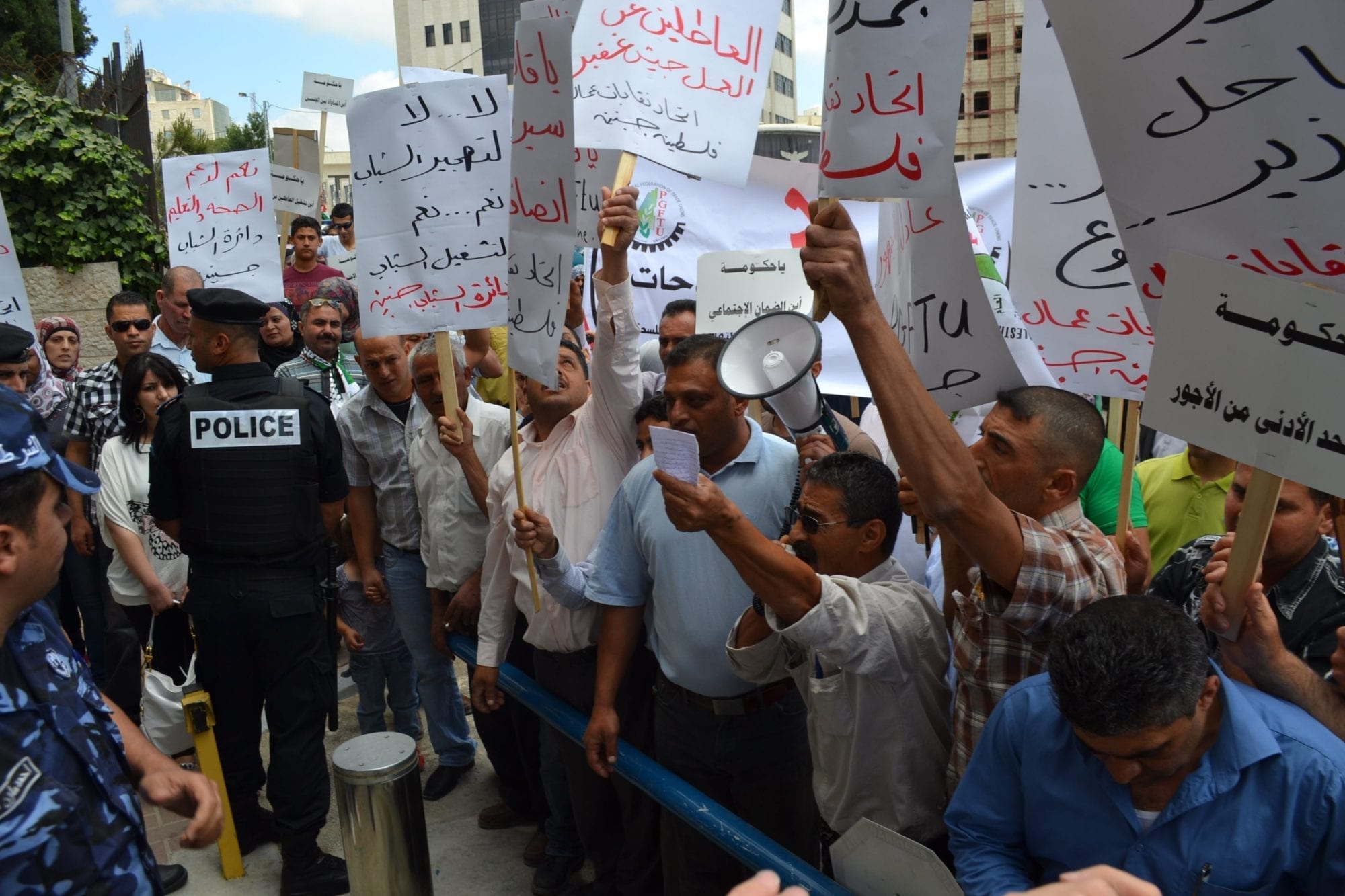
May 5, 2016
More than 300 the Palestinian General Federation of Trade Unions (PGFTU) members took part in the PGFTU Congress in Nablus late last month, where delegates voted to boost representation of women and reinforced the federation’s commitment to worker rights. They were joined by representatives from 16 international organizations, including the International Trade Union Confederation (ITUC), the Solidarity Center and the International Labor Organization (ILO).
Delegates at PGFTU’s Fifth Congress voted to increase from 20 percent to 30 percent the representation of women across all PGFTU bodies over the next four years; agreed to enforce Palestine’s minimum wage law and work to make it a living wage; and reinforced the PGFTU’s stance in defending the freedom to form unions.
Also during the three-day conference, PGFTU General Council members elected Shaher Saad as secretary general and voted in 24 representatives of national general unions, including four women, to the executive committee, along with seven men and women unionists to the financial and administrative audit committee. All will serve four-year terms. The elections were observed by representations from the ILO, the Arab Labor Organization and U.S. and European trade unions and federations.
Delegates backed ongoing dialogue with allies as the PGFTU campaigns for fair labor laws that guarantee decent work for workers and a fair social security law for workers and their families. In ensuring that women make up 30 percent of the federation’s leadership, delegates seek to guarantee their input in designing labor policies and executing union resolutions and reinforced their commitment to promoting the role of Palestinian working women as a key force in the national and local markets.
Participants also emphasized the need to network with civil society organizations and legal groups that to work toward establishing a democratic and transparent civil society.
In his remarks, Saad said workers will achieve social justice and fairness through a strong and independent trade union movement that seeks to elevate workers’ voices and protect him from exploitation.





